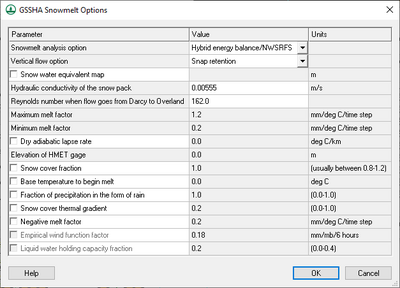WMS:GSSHA Snowmelt Options: Difference between revisions
From XMS Wiki
Jump to navigationJump to search
(Created page with "thumb|right|400px|The ''GSSHA Snowmelt Options'' dialog. The ''GSSHA Snowmelt Options'' dialog contains options for how GSSHA ha...") |
m (Jmonson moved page WMS:GSSHA Snowmelt Options Dialog to WMS:GSSHA Snowmelt Options) |
(No difference)
| |
Latest revision as of 23:14, 17 May 2019
The GSSHA Snowmelt Options dialog contains options for how GSSHA handles various aspects of snowmelt within the simulation. The dialog consists of three columns: Parameters, Value, and Units.
The Help button at the bottom of the dialog opens this page in a web browser.
The options are as follows:
- Snowmelt analysis option – A drop-down list with the following options:
- "Hybrid energy balance/NWSRFS" – A hybrid method based on both of the other two options.
- "Energy balance" – A simple method where the amount of heat available is applied to the snowpack and the amount of meltwater is calculated. See the GSSHA Wiki for more details.
- "Temperature index method" – A method of estimating snowfall accumulation and melting based on the National Weather Service River Forecasting System (NWSRFS) SNOW-17 model. See the GSSHA Wiki for more details. Selecting this option turns on Empirical wind function factor and Liquid water holding capacity fraction at the bottom of the dialog.
- Vertical flow options – A drop-down list with the following options:
- "Snap retention" – Uses the SNAP gravity flow model to distribute melt-water vertically through the snow pack and to the overland.
- "Vertical snow retention" – GSSHA creates multiple melt-waves (up to 6 simultaneous waves) that distribute the melt to the overland.
- Snow water equivalent map – Turn on this option to activate a drop-down list of all continuous maps in the project.
- Hydraulic conductivity of the snow pack – A decimal value in meters per second.
- Reynolds number when flow goes from Darcy to Overland – A unitless decimal value.
- Maximum melt factor – A decimal value in millimeters per degree Celsius per time step.
- Minimum melt factor – A decimal value in millimeters per degree Celsius per time step.
- Dry adiabetic lapse rate – Turn on this option to activate editability of this decimal value in degrees Celsius per kilometer. Also activates editability of Elevation of HMET gage (below).
- Elevation of HMET gage – A decimal value in meters.
- Snow cover fraction – A decimal value usually between "0.8" and "1.2".
- Base temperature to begin melt – A decimal temperature value in degrees Celsius.
- Fraction of precipitation in the form of rain – A decimal percentage value between "0.0" and "1.0".
- Snow cover thermal gradient – A decimal percentage value between "0.0" and "1.0".
- Negative melt factor – A decimal value in millimeters per degree Celsius per time step.
- Empirical wind function factor – A decimal value in millimeters per millibars per 6 hours.
- Liquid water holding capacity fraction – A decimal value between "0.0" and "0.4".
GSSHA | |
|---|---|
| XMS Wiki Links | Calibration (Automated • Manual • Output) • Channel Routing • Contaminants • Digital Dams • Embankment Arcs • Feature Objects (Arcs • Nodes • Polygons) • File Types • Groundwater • Groups • Hydraulic Structures • Job Control • Join SSURGO Data • Mapping Tables • Maps • Menu • Model Linkage • Multiple Simulations • Nutrients • Observations • Output Control • Overland Soil Erosion • Pipe and Node Parameters • Precipitation • Radar Rainfall • Save GSSHA Project File • Smooth GSSHA Streams • Snowmelt • Solution (Analysis • Data) |
| Related Tools | MWBM Wizard • Using Soil Type Data with GSSHA |
| GSSHA Wiki External Links | GSSHA Wiki: Overview • Primer • User's Manual • Tutorials |
WMS – Watershed Modeling System | ||
|---|---|---|
| Modules: | Terrain Data • Drainage • Map • Hydrologic Modeling • River • GIS • 2D Grid • 2D Scatter |  |
| Models: | CE-QUAL-W2 • GSSHA • HEC-1 • HEC-HMS • HEC-RAS • HSPF • MODRAT • NSS • OC Hydrograph • OC Rational • Rational • River Tools • Storm Drain • SMPDBK • SWMM • TR-20 • TR-55 | |
| Toolbars: | Modules • Macros • Units • Digitize • Static Tools • Dynamic Tools • Drawing • Get Data Tools | |
| Aquaveo | ||
